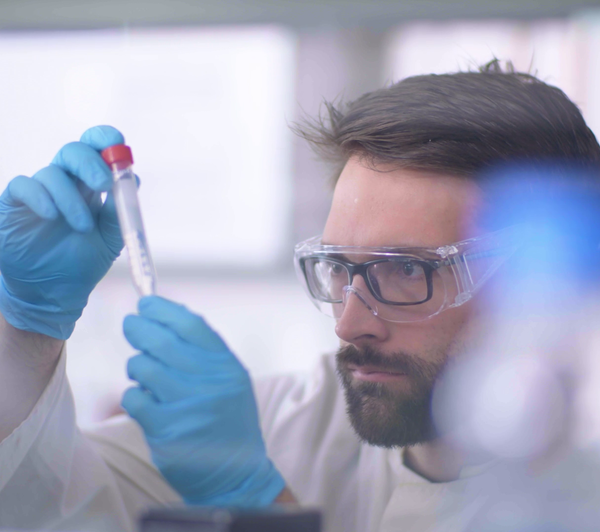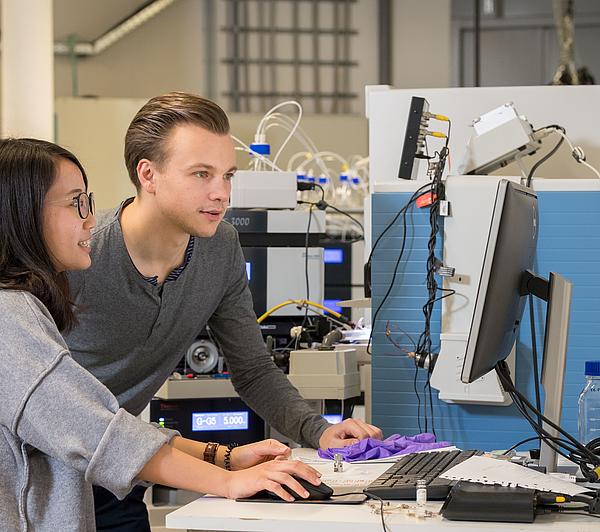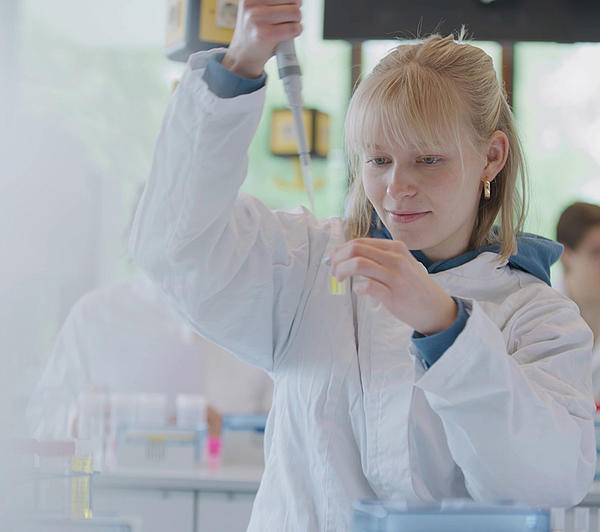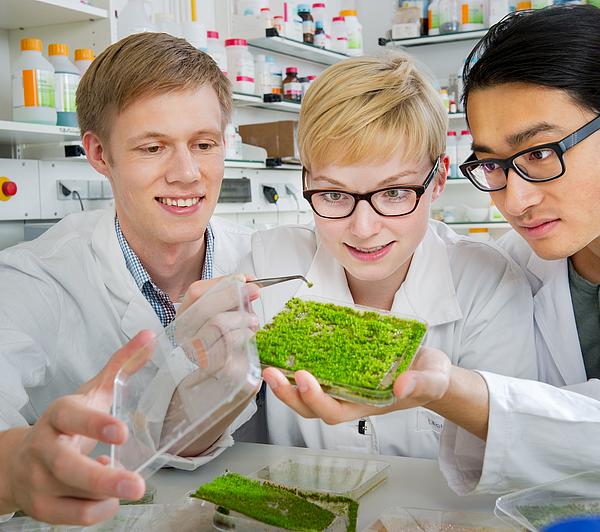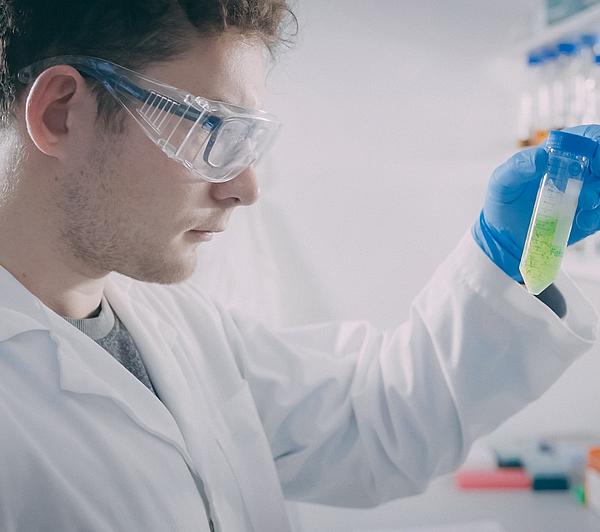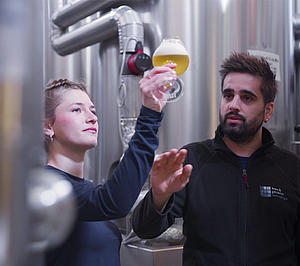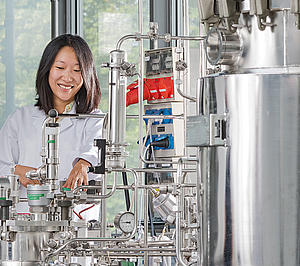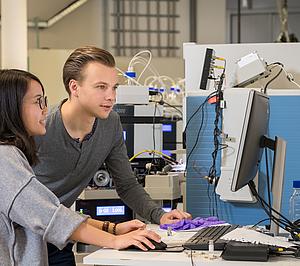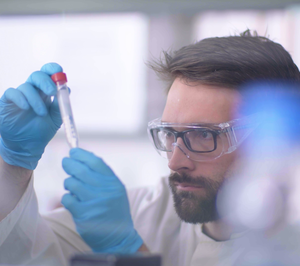Bachelor of Science, Stand 08/13 (ID 6278)
1. Semester
- Anorganische Chemie (10 CP)
- Biochemie 1 (8 CP)
- Höhere Mathematik und Statistik (8 CP)
- Physik für Life Sciences (7 CP)
2. Semester
- Aufbau u. Struktur organischer Verbindungen (5 CP)
- Biochemie 2 (8 CP)
- Mikrobiologie (6 CP)
- Physik für Life Sciences (7 CP)
- Physiologie: Human, Tier und Pflanze (8 CP)
3. Semester
- Bioinformatik für Biowissenschaften 1 (5 CP)
- Einführung in die Genetik (5 CP)
- Physikalische Chemie 1 (5 CP)
- Praktikum Biologische Chemie (8 CP)
- Reaktivität organischer Verbindungen (6 CP)
4. Semester
- Biochemie 3 (8 CP)
- Biochemische Analytik (6 CP)
- Einführung in die Biotechnologie (6 CP)
- Physikalische Chemie 2 (5 CP)
5. Semester
- Bioverfahrenstechnik (9 CP)
- Proteine, Protein-Engineering und Immunologische Prozesse (6 CP)
- Zellkultur und Molekulargenetik (6 CP)
6. Semester
- Abschlusskolloquium (3 CP)
- Allgemeine Pharmakologie (3 CP)
- Bachelor’s Thesis (12 CP)
- Molekulare Bakteriengenetik und Metabolic Engineering (6 CP)
- Rechtliche und wirtschaftliche Aspekte der Biotechnologie (6 CP)
weitere Module
- Allgemeinbildendes Fach (5 CP)
- Wahlmodule (10 CP, W)
- Angewandte Statistik (5 CP, W)
- Bioanorganische Chemie (3 CP, W)
- Molekulare Pflanzenbiologie und Züchtung (6 CP, W)
- Strukturbioinformatik (5 CP, W)
Master of Science (ID 6279)
- Fachübergreifend / allgemeinbildend (8 CP, W)
- Businessplan Grundlagenseminar (4 CP, W)
- Patentrecht (4 CP, W)
- Grundlagenmodule (40 CP, W)
- Angewandte Mikrobiologie (5 CP, W)
- Bioinformatik / Genomik (5 CP, W)
- Biopharmazeutische Technologie (5 CP, W)
- Biotechnologie der Pflanzen (5 CP, W)
- Biotechnologie der Tiere (5 CP, W)
- Mikrobiologie pathogener Organismen (5 CP, W)
- Molekulare Immunologie (5 CP, W)
- Molekulare Onkologie (5 CP, W)
- Protein-Engineering (5 CP, W)
- Proteomics (5 CP, W)
- Zellbiologie / Eukaryoten (5 CP, W)
- Master's Thesis (30 CP)
- Vertiefungsmodule (37 CP, W)
- PVM Angewandte Mikrobiologie (10 CP, W)
- PVM Bioinformatik / Genomik (10 CP, W)
- PVM Biologie human-pathogener Bakterien (10 CP, W)
- PVM Biopharmazeutische Technologie (10 CP, W)
- PVM Diverse Forschungspraktika (10 CP, W)
- PVM Immunpathologie & Ernährung (10 CP, W)
- PVM Kompaktkurs Molekulare Methoden der Bioanalytik 1+2 (5 CP, W)
- PVM Kompaktkurs und Seminar Biomolekulare Spektroskopie (5 CP, W)
- PVM Kompaktkurs und Vorlesung Proteinkristallographie (5 CP, W)
- PVM Mikroskopisches Praktikum zur Funktionellen Histologie (3 CP, W)
- PVM Molekular-physiologisches Praktikum (3 CP, W)
- PVM Molekulare Onkologie (10 CP, W)
- PVM Pflanzen (10 CP, W)
- PVM Praktikum Epigenetik (3 CP, W)
- PVM Praktikum Membranen und Membranproteine (3 CP, W)
- PVM Praktikum Protein- und Wirkstoffmodelierung (3 CP, W)
- PVM Protein-Engineering (10 CP, W)
- PVM Proteomics (10 CP, W)
- PVM Tiere (10 CP, W)
- PVM Zellbiologie / Eukaryoten 2 (5 CP, W)
- PVM Zellbiologie Eukaryoten (10 CP, W)
- ThVm Neurobiologie (3 CP, W)
- ThVm Aktuelle Methoden und Ergebnisse der Neurophysiologie (5 CP, W)
- ThVm Aktuelle Probleme der Genetik (2 CP, W)
- ThVm Analysis of High-Throughput Datasets for Biologists (8 CP, W)
- ThVm Biofunktionalität der Lebensmittel (5 CP, W)
- ThVm Bioinformatik für Biowissenschaften II (4 CP, W)
- ThVm Biologie humanpathogener Bakterien (5 CP, W)
- ThVm Biopharmazeutische Technologie (5 CP, W)
- ThVm Computer-aided Drug und Protein Design (3 CP, W)
- ThVm Endo-, para- und juxtakrine Regelmechanismen (2 CP, W)
- ThVm Entwicklung von Starterkulturen (6 CP, W)
- ThVm Entwicklungsgenetik (3 CP, W)
- ThVm Entwicklungsgenetik der Pflanzen 2 (5 CP, W)
- ThVm Evolution von Krankheitserregern (5 CP, W)
- ThVm Experimental Immunology and pathology (5 CP, W)
- ThVm Forschungspraktikum Neurobiologie (10 CP, W)
- ThVm Forschungspraktikum Physiologie (10 CP, W)
- ThVm Humangenetik (5 CP, W)
- ThVm Immunoinformatik (4 CP, W)
- ThVm Labortierwissenschaften (5 CP, W)
- ThVm Methods in Biotechnology (2 CP, W)
- ThVm Mikrobielle Toxine in der Nahrung (5 CP, W)
- ThVm Mikrobielle Vielfalt und Entwicklung (5 CP, W)
- ThVm Mikrobiologische Diagnostik (3 CP, W)
- ThVm Mikroorganismen in Lebensmitteln (5 CP, W)
- ThVm Molekulare Genetik (3 CP, W)
- ThVm Molekulare Pathologie und organspezifische Karzinogenese (6 CP, W)
- ThVm Molekulare Pflanzenphysiologie 1 (5 CP, W)
- ThVm Molekulare Pflanzenphysiologie 2 (5 CP, W)
- ThVm Molekulare Sensorik (5 CP, W)
- ThVm Molekulare Zellbiologie der Tumorentstehung (5 CP, W)
- ThVm Neurobiologie u. -genetik (6 CP, W)
- ThVm Neuropathologie Seminar (4 CP, W)
- ThVm Pflanzenbiotechnologie und -genetik (3 CP, W)
- ThVm Pflanzensystem-biologie (5 CP, W)
- ThVm Physiologie (5 CP, W)
- ThVm Projektseminar Membranproteine (3 CP, W)
- ThVm Proseminar Mikrobielle Wirkstoffe (2 CP, W)
- ThVm Proteinsynthese und-missfaltung (4 CP, W)
- ThVm Proteintechnologie: Membranen und Membranproteine (3 CP, W)
- ThVm Spezielle Immunologie (3 CP, W)
- ThVm Statistics in Bioscience I (6 CP, W)
- ThVm Strukturbioinformatik (5 CP, W)
- ThVm Übung in Pflanzen-systembiologie (9 CP, W)
- ThVm Vertiefungsmodul Pharmakologie (5 CP, W)
- ThVm Weiterführende Bioinformatik (6 CP, W)
- ThVm Wirts/Parasit-Wechselwirkung (5 CP, W)
- ThVm wissenschaftliches Kolloquium (2 CP, W)
- Wissenschaftliche Projektplanung (5 CP)




